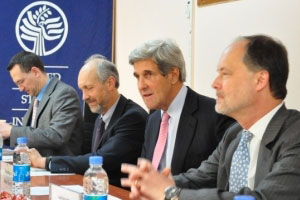USIP's Kabul Office Holds Roundtable with Sen. Kerry on Elections, Security
USIP's Kabul Office recently hosted a roundtable meeting for Senator Kerry (D-Mass), accompanied by Ambassador James Cunningham from the U.S. embassy, with representatives of Afghan political parties and civil society. The discussion included the ongoing security transition, the recently agreed upon Strategic Partnership Agreement (SPA) between the Afghan and U.S. governments, and the 2014 Afghan presidential elections.

USIP's Kabul Office recently hosted a roundtable meeting for Senator John Kerry (D-Mass), accompanied by Ambassador James Cunningham from the U.S. embassy, with representatives of Afghan political parties and civil society. Senator Kerry, the chairman of the Senate Foreign Relations Committee, discussed the ongoing security transition, the recently agreed upon Strategic Partnership Agreement (SPA) between the Afghan and U.S. governments, and the 2014 Afghan presidential elections.

The participants of USIP's roundtable welcomed the finalization of the SPA, and Senator Kerry emphasized its importance as a clear statement of the commitment of the U.S. to support Afghanistan after 2014. He underlined the need to ensure that gains made for women over the last 11 years needed to be built on and would be a particular focus of U.S. attention. The roundtable also discussed the upcoming Afghan presidential election in 2014, agreeing that the credibility of these elections were a crucial element of the political transition. Senator Kerry said that he would work to make sure that the U.S. would do all that it could to ensure the legitimacy of the Afghan presidential election process, but also stated that it was especially important for Afghans to clearly articulate their views on how the electoral process can be improved. All of the participants agreed on the need for continued dialogue between political leaders and civil society in both the U.S. and Afghanistan as the political transition moves forward.



